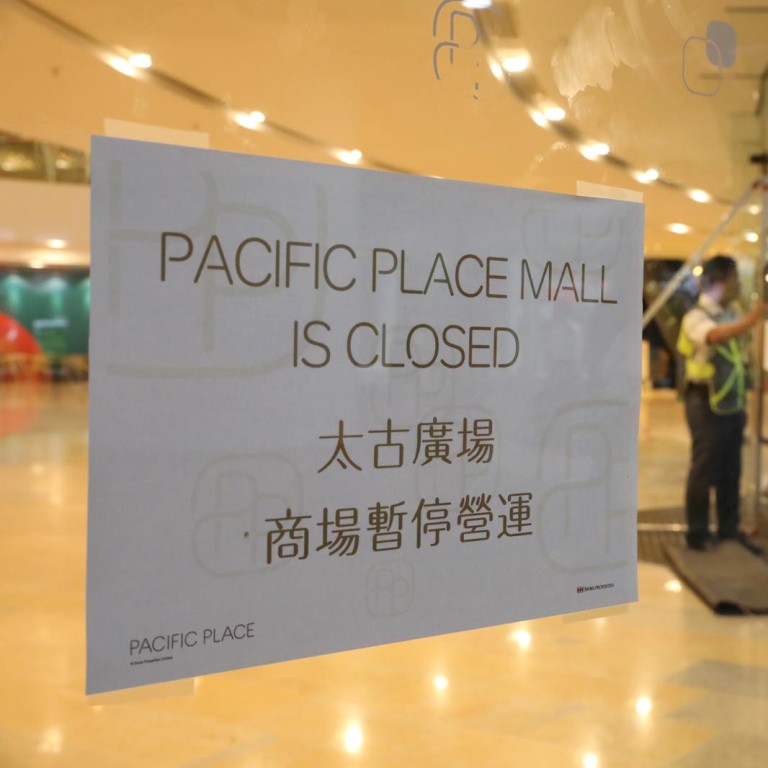
Swire becomes first Hong Kong developer to offer relief, lowers rents temporarily at Pacific Place in protest-hit Admiralty
- ‘Temporary rental adjustments’ are being made on a case-by-case basis, Swire Properties says
- Retailers likely to continue to face a challenging business environment ahead, JLL says
Swire Properties said on Friday it would offer “temporary rental adjustments” to tenants at Pacific Place, its flagship shopping centre in the protest-hit district of Admiralty, becoming the city’s first developer to cut rents.
Some shops at Pacific Place, home to international luxury brands such as Louis Vuitton, Chanel and Cartier, had to shut down early during weekends after protesters gathered in the area to demonstrate against the now-withdrawn extradition bill.
“We can confirm that Pacific Place will offer temporary rental adjustments to tenants, to support the Hong Kong retail industry, as well as our tenants, during this challenging time,” the developer, which is owned by Hong Kong conglomerate Swire Pacific, said in a statement.
“The adjustments are being made on a case-by-case basis, depending on an individual tenant’s business circumstances. As such, the majority of Pacific Place’s tenants will be offered a temporary rental concession,” the company said, but did not provide any further details.
The company, one of Asia’s largest conglomerates, had said during its interim results briefing last month that Pacific Place’s July retail numbers had been soft because of the protests.
CLSA renews office lease with Swire Group
“It is the first big developer to make such a move,” said Terence Chan, senior director of retail at JLL in Hong Kong. “It is hard to say whether other landlords will follow. It depends on the location and whether business has been affected by the recent social movement.”
“Despite this gesture of goodwill [by Swire], retailers are likely to continue to face a challenging business environment ahead,” said Denis Ma, head of research at JLL in Hong Kong. “Discretionary spending is being hit the hardest. Sales of watch and jewellery items, for example, have recorded big drops.”
The city’s retailers have sought help from their landlords. For instance, Chow Tai Fook, the world’s largest listed jeweller by market value, said it was actively looking for cuts during rent renewals. Meanwhile, the Hong Kong Retail Management Association last month called on landlords to cut rents by half for six months to help businesses tide over the current crisis.
The protests, now in their fourth month, have targeted Hong Kong shopping districts such as Central, Causeway Bay, Tsim Sha Tsui and Mong Kok, while online campaigns have urged people to spend less on Fridays and Sundays, and avoid retailers and companies that do not share the protesters’ political views.
On the tourism front, about 5.2 million people visited the city in July, which represents a year-on-year decline of 4.8 per cent, the Hong Kong Tourism Board said, while retail sales were down by 13 per cent year on year.
Then last month, tourism slumped by 40 per cent, leaving the industry with its second biggest year-on-year decline since the Sars epidemic in May 2003, Paul Chan Mo-po, the city’s Financial Secretary, said in a blog post this month. He had earlier said protests at the city’s international airport in August would lead to a sharp decline in numbers.
Swire Pacific sees stronger headwinds as Hong Kong grapples with protests
Chan has also warned of a possible recession in the third quarter and downgraded the economic growth forecast for the city to between 0 per cent and 1 per cent for the year, from between 2 per cent and 3 per cent estimated earlier.
Hong Kong’s economic growth in the second quarter stood at 0.6 per cent year on year.

